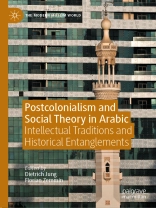Since Edward Said’s publication of Orientalism in 1978, so-called Western social theory and its claim to universal analytical validity has been exposed to severe criticism. Scholars from the field of postcolonial studies were most vocal in criticizing the Eurocentric nature of the conceptual apparatus of the social sciences. Indeed, contemporary social theory almost exclusively refers to the historical experiences of Western Europe and North America. Yet what is the alternative to these Eurocentric frameworks? Many postcolonial critics use very few non-English sources and tend to focus on the deconstruction of European and American theories.
The chapters of this volume provide a turn of perspective. The authors critically reflect upon the concepts of so-called Western social theory by engaging with social science literature and social theory in Arabic. Questions addressed include: What are the concepts, themes, and historical narratives in contemporary Arabic social theory? In which ways do Arab social theorists provide us with alternatives to the conceptual apparatuses employed by so-called Western social theory? To what extent are Arab and Western social theories entangled with each other?
Innehållsförteckning
Chapter 1: Beyond Deconstruction – An Introduction To Writing Social Theory In Arabic.- Part I: Social theory in Academic disciplines.- Chapter 2: (Post-)Colonialism, Authoritarianism, And Authenticity: Sociology In Arab Countries.- Chapter : Who Counts As A Theorist? Locating Maghrebi Sociologists In The Intellectual History Of Decolonization.- Chapter 4: Decentering First World War History: Arabic Perspectives On A Global Event.- Chapter 5: The Islamization Of Knowledge: Critique And Alternative.- Part II: Social theory Beyond Academic Disciplines.- Chapter 6: Liquid Modernity In Arabic.- Chapter 7: Crisis And Creativity: Tradition And Revolution In Arab Social Theory.- Chapter 8: The Road Out Of Marxism: Entangled Thought In 1970s Lebanon.- Chapter 9: Arabic Social Theory In Japanese And Indonesian: Transregional Ideoscapes Of The Long 1960s.
Om författaren
Dietrich Jung is a professor in Middle East and Islamic studies at the University of Southern Denmark in Odense, Denmark.
Florian Zemmin is a professor of Islamic studies at Freie Universität in Berlin, Germany.












